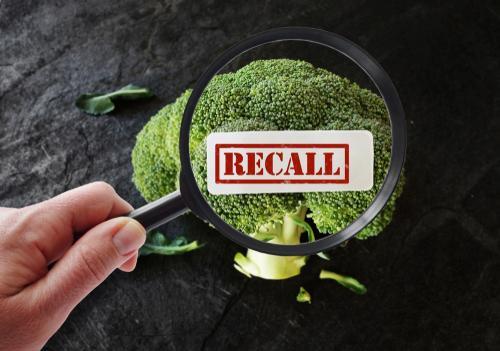
312-981-0409
33 N Dearborn St 10th Floor, Chicago, IL 60602
Serving Clients Across 7 Illinois Locations
Recent Blog Posts
Listeria Outbreak Linked to Cheese: Pregnant Women Most at Risk
 A listeria outbreak has been tied to Brie and Camembert cheeses. Listeria is especially dangerous for moms-to-be because an infection can cause pregnancy loss and stillbirths. Young children, the elderly, and those with a weaker immune system also face a higher risk of illness. So far, five people in the United States have been hospitalized because of this outbreak. If you felt sick after eating one of these cheeses, you need a listeria food poisoning attorney who can help.
A listeria outbreak has been tied to Brie and Camembert cheeses. Listeria is especially dangerous for moms-to-be because an infection can cause pregnancy loss and stillbirths. Young children, the elderly, and those with a weaker immune system also face a higher risk of illness. So far, five people in the United States have been hospitalized because of this outbreak. If you felt sick after eating one of these cheeses, you need a listeria food poisoning attorney who can help.
Brie and Camembert Cheeses Recall
All Old Europe Cheese Brie and Camembert products were distributed to stores across the nation and Mexico between August 1, 2022, and September 28, 2022. Some of the retailers that carry them include Albertsons, Safeway, Whole Foods, Sprouts, Save Mart, and Stop & Shop, among others.
Retailers may have repackaged bulk cheese into smaller packages for sale. That packaging may not have the original food labels. The cheese was sold under multiple brand names including Black Bear, Trader Joe, Prestige, Primo Taglio, Glenview Farms, and Cobblestone, among others.
Did Potatoes with Mustard Sauce Trigger a Severe Allergic Reaction?
 You would think you could trust the packaging labels at your local grocery store, but incorrect labeling of products happens more often than we would like. Each year some 90,000 people end up in the emergency room after suffering a severe allergic reaction to food due to improper labeling. The most recent recall involves packaged potatoes that you microwave. Food allergies are an increasing public health concern in the United States, and food labels are often the only line of defense.
You would think you could trust the packaging labels at your local grocery store, but incorrect labeling of products happens more often than we would like. Each year some 90,000 people end up in the emergency room after suffering a severe allergic reaction to food due to improper labeling. The most recent recall involves packaged potatoes that you microwave. Food allergies are an increasing public health concern in the United States, and food labels are often the only line of defense.
Dutch Red Potatoes with Dijon Mustard Sauce
World Variety Produce Inc. recalled Melissa’s Dutch Red Potatoes with Dijon Mustard Sauce. The product contains eggs, but they are not listed on the food label. Federal law requires known allergens such as eggs, peanuts, and other ingredients to be printed on food labels when it is in or a part of the product. In this case, the sauce includes a cream that is tossed over the potatoes when it is ready to cook.
Some Dinner Rolls Made Me Sick: Legal Options After Food Poisoning
 You may often pair thoughts of your favorite comfort foods with dinner rolls. But 37 types of bread that found their way onto dinner tables, grocery stores, and restaurants have been recalled because they contain dangerous bacteria. Babies, the elderly, and those with a weakened immune system are most at risk. If you or a family member experienced food poisoning due to someone else’s negligence, it is a very serious matter.
You may often pair thoughts of your favorite comfort foods with dinner rolls. But 37 types of bread that found their way onto dinner tables, grocery stores, and restaurants have been recalled because they contain dangerous bacteria. Babies, the elderly, and those with a weakened immune system are most at risk. If you or a family member experienced food poisoning due to someone else’s negligence, it is a very serious matter.
Bread Products Recalled
The recall involves dinner rolls, sandwich rolls, and buns that were made between March 21, 2022, and April 25, 2022, with an ingredient supplied by Lyons Magnus, a company that also makes nutritional drinks and coffee. Piantedosi Baking Company announced the recall in August. Here are some of the products included in that recall:
-
Hawaiian Sandwich Roll
CDC: Dozens Suffer in E. Coli Outbreak Linked to Wendy’s
 When we stop for a quick bite to eat at a fast-food restaurant, we generally temper our expectations about the overall quality of the food. While it can certainly be frustrating, we are more or less willing to accept slightly cold fries in exchange for the convenience of a meal on the go. However, our expectations for food safety do not change, and we never expect to suffer from food poisoning when we choose fast food.
When we stop for a quick bite to eat at a fast-food restaurant, we generally temper our expectations about the overall quality of the food. While it can certainly be frustrating, we are more or less willing to accept slightly cold fries in exchange for the convenience of a meal on the go. However, our expectations for food safety do not change, and we never expect to suffer from food poisoning when we choose fast food.
Unfortunately, this is exactly what reportedly happened to at least 97 people in six states after eating sandwiches from Wendy’s restaurants. According to the U.S. Centers for Disease Control and Prevention (CDC), those who experienced foodborne illness as part of this outbreak were infected with a specific strain of E. coli.
Details of the Outbreak
The first reports of illness associated with what would become a multi-state E. coli outbreak started in late July and continued through the second week of August. Cases of E. coli infections were reported in Michigan, Indiana, Kentucky, Ohio, Pennsylvania, and New York, with more than half of all of the reported cases being from Michigan.
Back to School Food Safety: Your Kids Can Help Keep Themselves Safe
 In our last post, we talked about a variety of things that you, as a parent, can do when prepping your children’s lunches to maximize food safety. We mentioned that preventing foodborne illnesses begins during back-to-school shopping, where it is easy to pick up insulated lunch bags, ice packs, and other items that can help keep lunch food at safe temperatures. Keeping a clean workspace and packing the night before can also help prevent dangerous bacteria from growing to unsafe levels before lunchtime at school.
In our last post, we talked about a variety of things that you, as a parent, can do when prepping your children’s lunches to maximize food safety. We mentioned that preventing foodborne illnesses begins during back-to-school shopping, where it is easy to pick up insulated lunch bags, ice packs, and other items that can help keep lunch food at safe temperatures. Keeping a clean workspace and packing the night before can also help prevent dangerous bacteria from growing to unsafe levels before lunchtime at school.
Today, let’s take a look at some of the things your kids can do to help keep themselves safe. Food safety starts with you, but once your children leave for school, the responsibility shifts to them.
Avoid Moving Things Around
Children are curious creatures, and your kids will probably be dying to know what they are getting for lunch. While it is fine for them to look in their lunchbox or bag, they should be aware of how you packed it. If you strategically place an ice pack or a frozen juice box next to something that needs to stay cold, be sure that your children know not to move things around too much.
Back to School Food Safety: Safe Food Prep
 A quick look around any discount store or department store will prove it: “back-to-school” season is officially here. Weatherwise, we are at the height of summer, but in a few short weeks, children throughout Illinois and across the country will soon return to the classroom. If you are the parent of school-aged children, your to-do list is probably starting to grow, but keeping your children safe is always a top priority. With this in mind, we will spend the next few posts talking about the importance of food safety as it pertains to your child’s lunch box. Today, we are focusing on safe food prep practices that reduce the chances of your child developing a foodborne illness.
A quick look around any discount store or department store will prove it: “back-to-school” season is officially here. Weatherwise, we are at the height of summer, but in a few short weeks, children throughout Illinois and across the country will soon return to the classroom. If you are the parent of school-aged children, your to-do list is probably starting to grow, but keeping your children safe is always a top priority. With this in mind, we will spend the next few posts talking about the importance of food safety as it pertains to your child’s lunch box. Today, we are focusing on safe food prep practices that reduce the chances of your child developing a foodborne illness.
Cold Packs and Insulation
Your child’s school lunch safety starts long before the lunch bell rings. In fact, as you are doing your back-to-school shopping, there are a few things that should be on your list that can help prevent food poisoning. Specifically, you should consider getting insulated lunch bags or boxes and cold packs to go in them.
Food Recalls and Staying Safe from Foodborne Illness
 Each year, dozens of food products in the United States are recalled due to the food poisoning risk they present. Sadly, many recalls do not happen until a few people—or more—have already gotten sick after consuming the food product. Thankfully, many others are initiated before reports of foodborne illness start rolling in.
Each year, dozens of food products in the United States are recalled due to the food poisoning risk they present. Sadly, many recalls do not happen until a few people—or more—have already gotten sick after consuming the food product. Thankfully, many others are initiated before reports of foodborne illness start rolling in.
Despite these efforts to keep the public safe, it is not uncommon for people to continue getting sick even after a recall has been issued. To prevent this and to keep yourself protected, it is important to know where you get food recall information and what you should do if you find a recalled product in your refrigerator or pantry.
Keeping Abreast of Food Recalls
Orders for food recalls generally come from the United States Food and Drug Administration (FDA), the United States Department of Agriculture (USDA), or the Centers for Disease Control and Prevention (CDC). These government entities are responsible for food safety, as well as investigations into food poisoning outbreaks. It is also possible for a food producer to issue a preemptive and voluntary recall upon learning about possible contamination.
Food Poisoning and Reactive Arthritis
 When an individual contracts a foodborne illness after eating contaminated food, he or she may suffer a wide variety of symptoms and health concerns. In addition to the direct effects of food poisoning, the person in question might also experience other issues that could negatively affect his or her overall well-being. One of these secondary issues or complications is called reactive arthritis. Reactive arthritis can cause severe pain that affects the individual’s ability to work and perform their daily tasks.
When an individual contracts a foodborne illness after eating contaminated food, he or she may suffer a wide variety of symptoms and health concerns. In addition to the direct effects of food poisoning, the person in question might also experience other issues that could negatively affect his or her overall well-being. One of these secondary issues or complications is called reactive arthritis. Reactive arthritis can cause severe pain that affects the individual’s ability to work and perform their daily tasks.
A Look at Reactive Arthritis
Reactive arthritis is not fully understood by the medical community, and it is a relatively uncommon condition. It is thought to be an autoimmune disorder, as it seems to be a condition in which the body’s immune system goes after healthy tissue. In some cases, reactive arthritis occurs as part of the physiological response to a gastrointestinal infection, including an infection caused by food poisoning.
What You Need to Know About Liability for Summer Cookout Food Poisoning
 This week, families around Northern Illinois and across the country gathered to celebrate Independence Day. For many people, such celebrations include backyard cookouts with massive spreads of delicious food of all types.
This week, families around Northern Illinois and across the country gathered to celebrate Independence Day. For many people, such celebrations include backyard cookouts with massive spreads of delicious food of all types.
Unfortunately, it is not uncommon to attend a Fourth of July cookout and then come home feeling a bit unwell. Before long, you might feel quite ill and have symptoms such as nausea, diarrhea, vomiting, and fever. You might even recognize the situation as attributable to something you ate, but the term “food poisoning” might feel like a stretch. However, the reality is that if something you ate made you sick and food allergies are not to blame, there is a good chance that you are, in fact, suffering from food poisoning.
Potential Liability for the Host
Over the last few weeks, posts on this blog have offered some summer cookout safety tips so that those who host backyard meals can help prevent their guests from getting sick. However, foodborne illnesses are still possible at summer cookouts. The first potential source of liability for summer cookout food poisoning is the person who hosts the get-together.
Summer Cookout Safety Tips: Keeping Hot Foods Hot and Cold Foods Cold
 Over the last couple of blog posts, we have talked about some of the ways to keep your guests from contracting foodborne illnesses during your summer cookouts. Previously, we have discussed maintaining a clean grill and proper handling procedures for meats, chicken, and seafood. While grilling is a big part of most summer cookouts, there is often a variety of other foods that help to complete a backyard meal. With several months of warm weather — and numerous opportunities for cookouts — still to go this year, it is time to talk about keeping the side dishes safe as well.
Over the last couple of blog posts, we have talked about some of the ways to keep your guests from contracting foodborne illnesses during your summer cookouts. Previously, we have discussed maintaining a clean grill and proper handling procedures for meats, chicken, and seafood. While grilling is a big part of most summer cookouts, there is often a variety of other foods that help to complete a backyard meal. With several months of warm weather — and numerous opportunities for cookouts — still to go this year, it is time to talk about keeping the side dishes safe as well.
Maintaining Safe Temperatures
Most backyard barbecues are more or less buffet-style meals, especially those that involve larger numbers of guests. The most basic food safety rule for buffet-style meals is to keep foods hot if they are supposed to be hot and cold if they are supposed to be cold. Hot means above 140° F, and cold means below 40° F. The “danger zone” for food safety is between these temperatures, and food should not be left in the danger zone for longer than two hours. If the outdoor temperature is above 90° F, food should not be in the danger zone for longer than one hour. Dangerous bacteria can multiply very quickly in the danger zone.
-

Foreclosure and Bankruptcy
Visit Website -

Real Estate and Estate Planning
Visit Website -

Personal Injury
Visit Website

 Spanish
Spanish Cantonese
Cantonese















